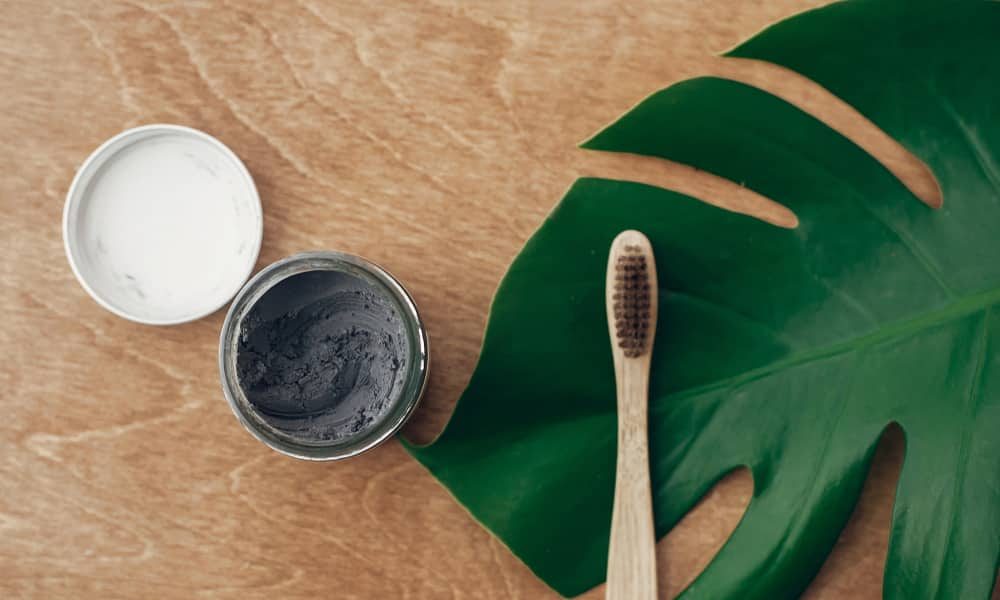Most of us grew up with regular store-bought toothpaste and did not really give much thought to it. However, these oral care staples contain some questionable ingredients such as synthetic dyes, triclosan, titanium dioxide, and others, making natural homemade toothpaste a better alternative.
Sure, you can find natural toothpaste on a shelf in your local health store but as is the case with most natural commercial products, the cost of stocking up on these ‘green’ toothpaste can add up quickly even for a small family.
Making your own toothpaste is a lot cheaper and incredibly simple too. You probably already have most of the ingredients you need to get started and if not, you can easily pick them up. These recipes do not call for preservatives so we recommend making small batches that you can quickly use up.
Without further ado, here are our favorite natural homemade toothpaste options.
1. Coconut-Mint Homemade Toothpaste
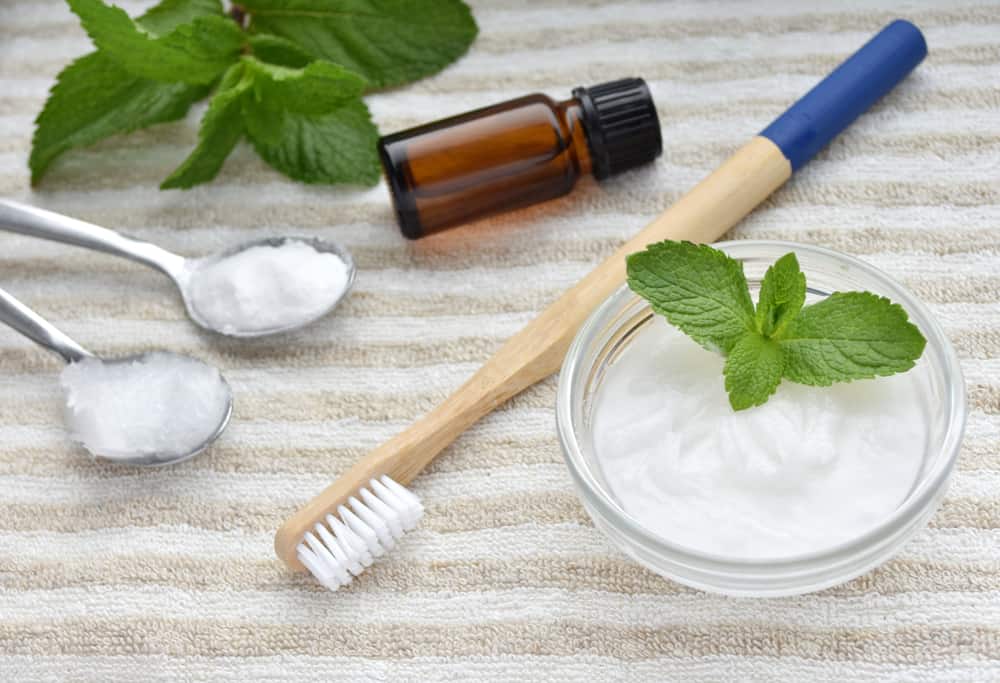
Both coconut oil and mint essential oil have amazing benefits for dental health.
For one, coconut oil contains lauric acid, a powerful compound that attacks Streptococcus mutans, oral bacteria responsible for causing gum disease and tooth decay. Coconut oil also prevents plaque buildup.
On the other hand, peppermint, commonly known as mint, helps to eliminate anaerobic bacteria, which can make you prone to oral health issues. That tingly cooling sensation you get after brushing your teeth comes from a compound known as menthol found in mint.
Considering these benefits, coconut-mint natural homemade toothpaste is a great addition to your daily oral health routine.
Ingredients
- 10-15 drops peppermint essential oil
- ½ cup coconut oil
- 1 tablespoon baking powder
- Optional: 1 tablespoon natural sweetener e.g. xylitol
Method
Heat the coconut oil on very low heat in a small pan and allow to melt. Remove the pan from the heat and allow to cool for a few minutes. Stir in the rest of the ingredients.
Allow the mixture to cool completely before storing in a small glass jar. Use a spoon to scoop the paste or dip your toothbrush into the jar. Just be sure not to wet your toothbrush before dipping it into the jar to avoid liquefying the paste.
2. Natural Homemade Toothpaste With Calcium Powder
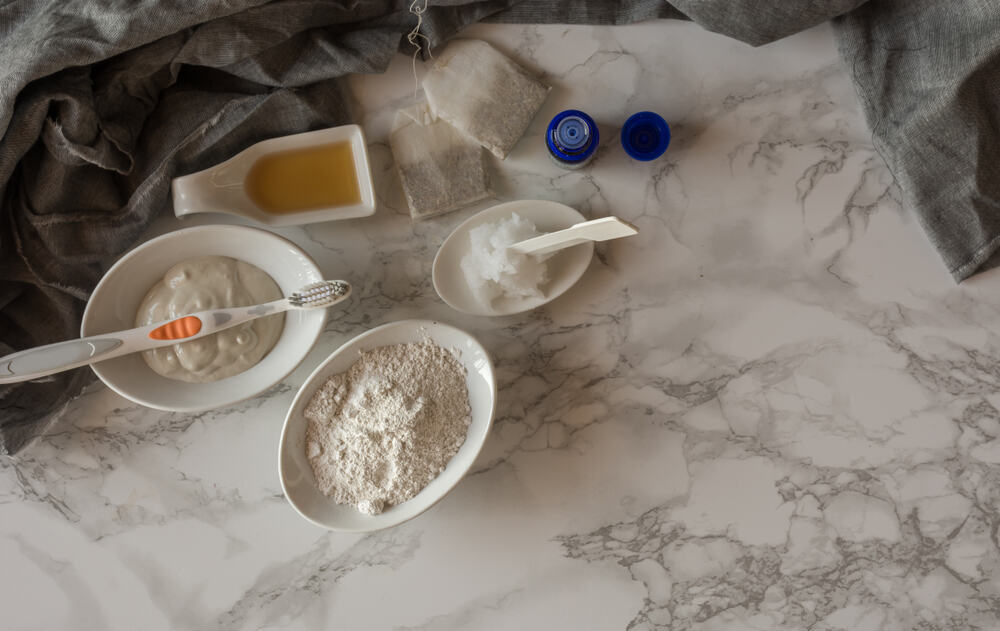
Calcium plays an important role in maintaining healthy teeth and gums in both adults and children. In particular, this vitamin strengthens the jawbone, which serves to keep teeth in place. Calcium powder is readily available in health stores and online.
This natural toothpaste recipe also utilizes baking soda, which not only helps with the consistency of the paste but also works as an abrasive to whiten teeth.
That being said, we recommend using baking soda moderately in your recipes to avoid damaging enamel, the outer covering that protects the tooth.
Other ingredients include coconut oil and xylitol, a natural non-cavity causing sweetener that also keeps harmful bacteria from sticking to the teeth.
Ingredients
- ¼ cup coconut oil
- 2 tablespoons calcium powder
- 1 tablespoon xylitol
- 1 ½ tablespoons baking soda
Method
In a small saucepan, heat the coconut oil on a low flame until the oil is relatively warm. It is easier to mix all the ingredients in warm oil.
Stir the baking soda and xylitol into the oil and blend well. Add the calcium powder bit by bit as you continue to stir the rest of the ingredients until you have a consistent paste.
Store in a mason jar or alternatively, in a ziplock bag so you can easily squeeze the toothpaste.
3. Chocolate Mint Homemade Toothpaste
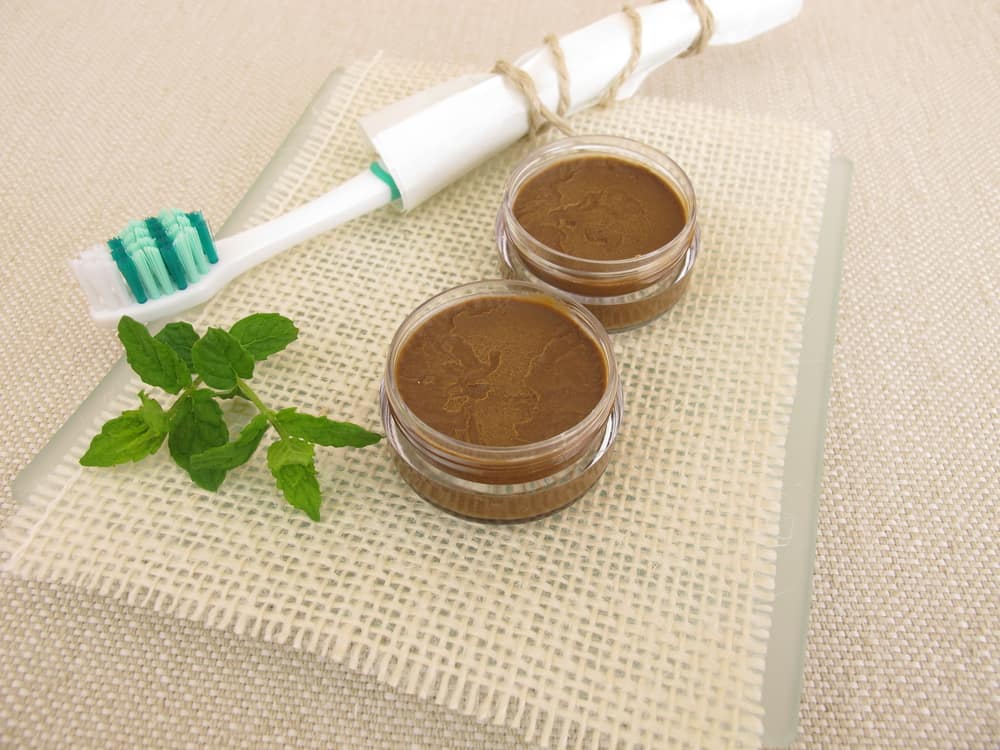
Chocolate often gets a bad rap as a food that increases the risk of tooth decay, plaque, and cavity. However, dentists say that a compound found in dark, unsweetened cocoa extract could actually be more effective than fluoride when it comes to preventing cavities.
The compound we are referring to is CBH, a white powder with crystal-like consistency whose chemical characteristics are quite similar to caffeine. CBH aids in strengthening enamel, therefore, reducing the risks of tooth decay.
If you are not a big fan of the fluoride found in regular toothpaste, it might come as good news that you can replace this chemical with chocolate!
However, dentists say that you will benefit more from using cocoa nibs than you will from digging your teeth into a sugary bar of your favorite chocolate.
This chocolate mint natural homemade toothpaste does just that—it uses cocoa nibs, which can help with strengthening enamel. The particles also add some texture to the paste, leading to a thorough clean.
The only downside is that the nibs might get stuck in between your teeth but that’s a great excuse to floss, which, as you know, improves your dental health.
Ingredients
- Finely ground cacao nibs
- 1 tablespoon baking soda
- 1 tablespoon distilled water
- 1 tablespoon bentonite clay
- 10-15 drops mint essential oil
Method
To make cacao nibs, grind whole cacao beans in a grinder until you have the desired texture.
Mix all the dry ingredients thoroughly before gradually adding distilled water. Add as much or as little water as you need to get a consistency that you like.
Lastly, add some drops of mint essential oil. Pack the paste in an airtight container.
4. Natural Homemade Remineralizing Toothpaste
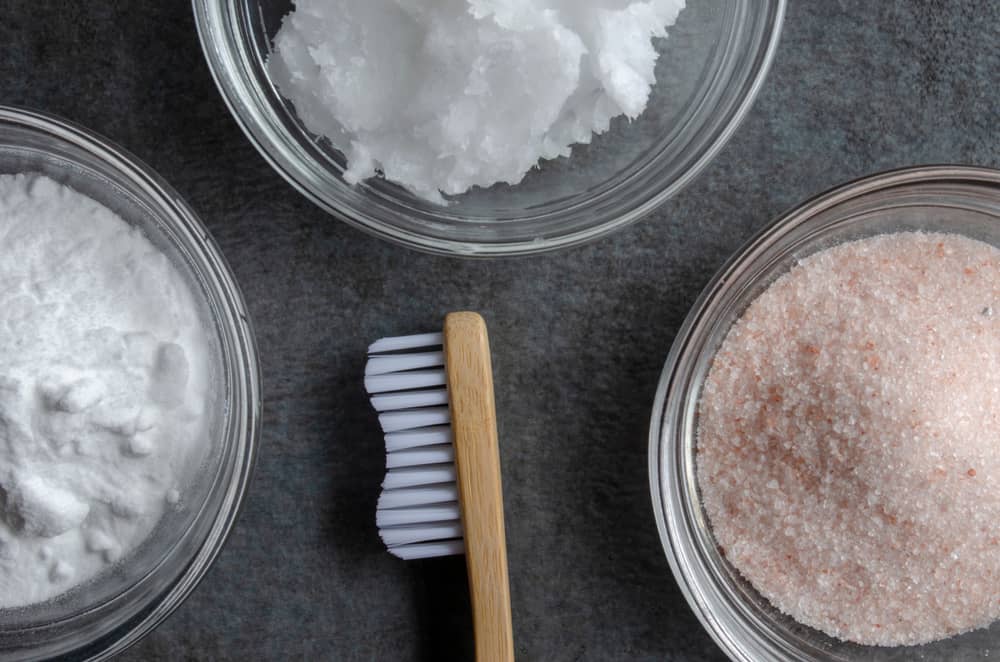
Some of the minerals found in the mouth help to protect and strengthen teeth by reinforcing enamel.
Poor dental hygiene and lifestyle choices can lead to the reduction of these crucial minerals, which in turn decreases enamel and exposes teeth to plaque, decay, and cavities. This process is known as demineralization.
Fluoride, the main ingredient in regular toothpaste, can help to restore tooth enamel, a process known as remineralization. However, if you are trying to avoid fluoride, you can consider other equally effective natural alternatives.
One natural fluoride alternative that comes to mind is bentonite clay. This is supple, natural occurring clay containing volcanic ash. Added to natural homemade toothpaste recipes, bentonite can help to restore minerals in the teeth and minimize sensitivity.
This recipe also includes natural trace minerals such as zinc, copper, selenium, iron, molybdenum, iodine, chromium, and fluoride. You can include any of these in your natural toothpaste.
Ingredients
- 4 tablespoons bentonite clay
- 3 tablespoons baking powder
- 4 tablespoon coconut oil
- 10-15 drops essential oils such as mint or tea tree oil
- 3 tablespoon sesame oil
- 4 tablespoons calcium powder
- 10 drops trace minerals
Method
On a low flame, warm coconut oil in a small pan for a few minutes. Remove the pan from the heat and add all the other ingredients into the warm oil.
We recommend using a wooden or plastic spoon instead of a metal spoon, which can react with the bentonite clay and minimize its effectiveness. Stir for a few minutes, making sure to thoroughly mix all the ingredients.
Set the mixture aside and give it time to cool into thick toothpaste. Store in your favorite silicone tube or mason jar.
5. Homemade Probiotic Toothpaste
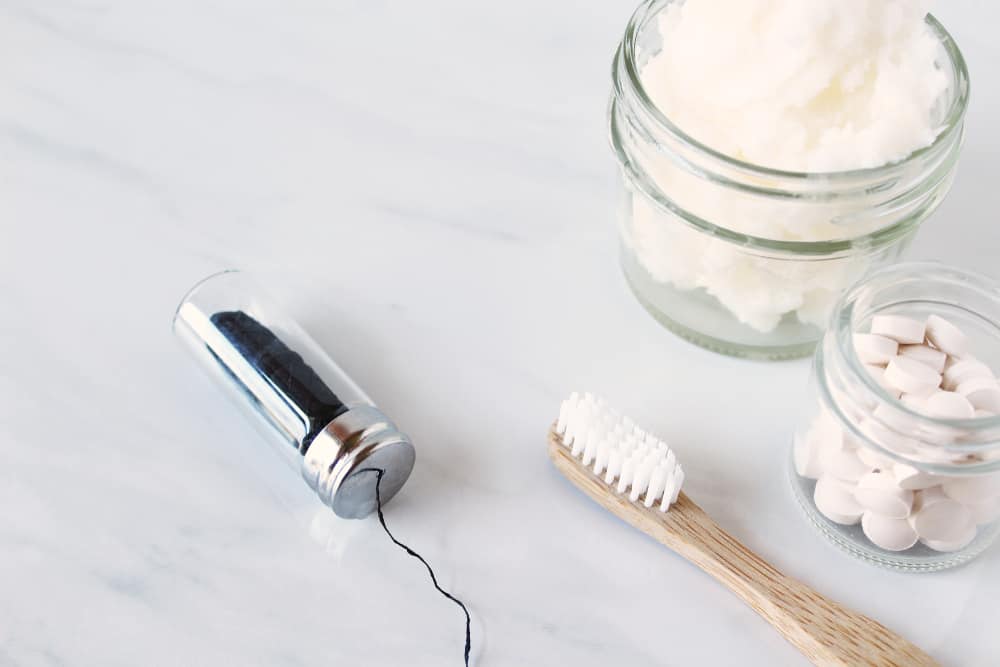
Getting rid of plaque buildup can be quite difficult. Normal toothpaste may help to minimize that slimy coating on your teeth and mouth but it will not eliminate it completely.
Mouthwash might seem like a good alternative but it really is not. Even though it leaves your mouth feeling squeaky clean, store-bought mouthwash can strip away both bad and good bacteria. Without the good bacteria in your mouth, your teeth can become highly prone to decay and cavities.
So, how do you completely get rid of plaque without stripping your mouth of the good bacteria? Natural homemade probiotic toothpaste might help. Probiotics are beneficial bacteria that make your mouth healthier.
In addition to probiotics, this recipe also contains prebiotics, natural fiber compounds that enhance the effectiveness of probiotics.
Ingredients
- 1 capsule probiotics (preferably organic)
- 1 capsule of inulin-based prebiotic such as fructooligosaccharides
- ½ xylitol
- 2 tablespoons coconut oil
- 2 tablespoons bentonite clay
- 10 drops essential oil such as peppermint
Method
Warm the coconut oil in a small saucepan on low heat for a few minutes. Remove from heat and set aside.
Pull each of the probiotic and prebiotic capsules apart and pour the powder over a small bowl containing the other ingredients.
Stir in all the ingredients into the coconut oil until well blended. Store the paste in small jars at room temperature.
Note that the more bentonite clay you add, the thicker the paste will be.
6. Natural Vegan Glycerin Toothpaste
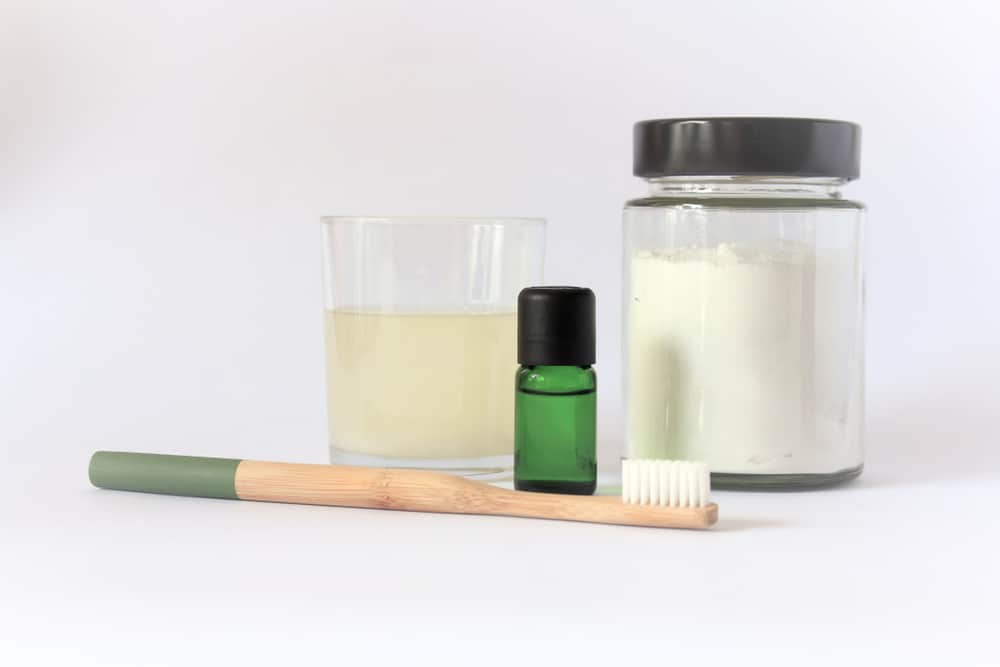
Glycerin is one of those ingredients that are readily available in many a pantry. This clear, syrup can be derived from petroleum, animal products, or plants.
If you are looking for a cleaner type of glycerin, the plant-based one might be a good choice. Characterized by a sweet taste, vegan glycerin is made by heating vegetable fats such as coconut, soy, and palm oils together with a powerful alkaline compound such as lye.
The heat and pressure cause the glycerin to separate from the oils and the resulting compound is mixed with water to form the scentless, syrupy, and sweet liquid. Vegan glycerin is generally safe and many commercial brands use the syrup to keep toothpaste from drying and hardening.
Additionally, glycerin is bacteriostatic, meaning it prevents the production of bacteria. This is especially helpful in fighting plaque and tooth decay. Not only that, but it also aids in the production of good bacteria, which makes the mouth a healthy place.
This recipe also calls for guar gum, which helps to thicken the paste. A suitable alternative is xanthan gum, which works the same way.
Ingredients
- 2 tablespoons vegan glycerin
- ½ teaspoon guar gum
- 4 tablespoon baking soda
- 8 tablespoon water
- 10 drops peppermint essential oil
Method
Add all the ingredients into a small saucepan and cook on low heat. Stir continuously for about five minutes or until you achieve the consistency you like.
Remove the goo from the heat and set aside to cool. Add up to ten drops of peppermint essential oil and stir lightly. Store your paste in an airtight container ready for use.
7. Kid’s Homemade Toothpaste
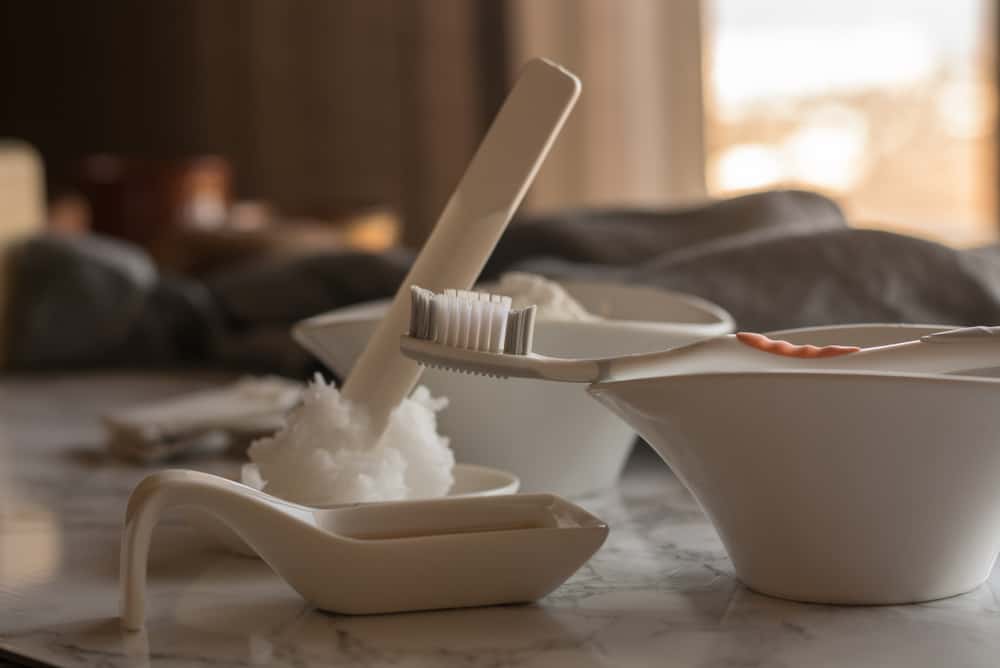
The ingredients in homemade toothpaste do a great job of fighting bacteria, whitening, remineralizing, and keeping your mouth fresh. However, baking soda, bentonite clay, salt, peppermint, and all that ‘adult’ stuff might not be as appealing to kiddos.
To get your little ones to use (and not spit out) homemade toothpaste, consider swapping some ingredients with other equally healthy and natural ones. For example, while you may leave out xylotin or stevia from your own toothpaste, adding this will sweeten things up a bit and the kids might actually start enjoying the DIY toothpaste.
Also, if they are finding peppermint to be a bit too strong, you could switch to something with a sweet and tangy flavor like sweet orange or grapefruit essential oil. Be sure to go easy on the baking powder and bentonite clay if you choose to include these in the recipe.
As an aside, encourage the kids to help with making this recipe. It can be a nice way to get them accustomed to the new, different-tasting but totally worth it toothpaste.
Ingredients
- 1 tablespoon baking soda
- 1 tablespoon bentonite clay
- ¼ teaspoon stevia
- 1/3 cups coconut oil
- 5-10 sweet orange essential oil
Method
Warm the coconut oil in a small saucepan on low heat for about five minutes and then remove to cool.
In a small bowl add the bentonite clay, baking soda, and coconut oil and mix thoroughly. Add the rest of the ingredients and continue to mix to achieve the consistency you like.
Store the toothpaste in silicone tubes or small mason jars and use as usual.
Conclusion
Natural homemade toothpaste might not be as good-looking or as ‘tasty’ as its commercial counterparts. However, if you prefer to know what you and your loved ones are putting in your mouth, making your own toothpaste is a smart choice. Not only that, but you could realize a good amount of savings too. With a good dental routine backed by toothpaste that is friendly to your teeth, you sure will have plenty of reasons to smile.
